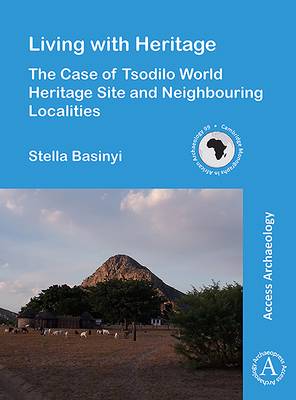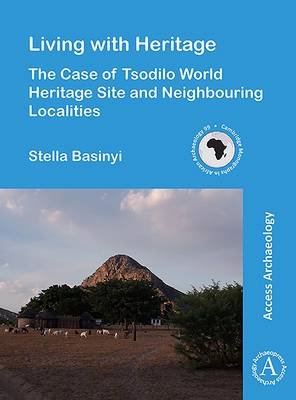
- Retrait gratuit dans votre magasin Club
- 7.000.000 titres dans notre catalogue
- Payer en toute sécurité
- Toujours un magasin près de chez vous
- Retrait gratuit dans votre magasin Club
- 7.000.0000 titres dans notre catalogue
- Payer en toute sécurité
- Toujours un magasin près de chez vous
Living with Heritage
The Case of Tsodilo World Heritage Site and Neighbouring Localities
Stella Basinyi
43,45 €
+ 86 points
Description
Cultural Heritage Management in most parts of Africa has been concerned and focused on conservation and preservation of cultural and natural heritage and the development of sites for tourism and economic benefit. In this venture, the tangible heritage such as monuments and landscapes become the focus and of primary significance. Therefore, most efforts have failed to grasp the significance and relevance of cultural heritage to the local communities and the existing traditional and cultural attachment to heritage sites beyond the economic gain. Of late, operational guidelines of the WH Conventions have targeted the engagement of communities in the management of their local heritage and shaping visitor experiences. The major challenge is the implementation of these agreements and restoration of cultural pride in local communities. The communities' interest in heritage areas has been overshadowed by the perceived idea of economic gain and the global agenda for preservation of monuments for future generation as the foremost primary benefit in heritage over cultural rights and entitlement to heritage sites, present day cultural valuation and traditional use. In 2008 several heritage sites in Botswana were opened for tourism in addition to the Tsodilo World Heritage Site. Furthermore, in June 2014 the Okavango Delta covering a vast range of land occupied by cultural communities was also inscribed on the World Heritage List, becoming the second World Heritage Site in the country. However, insufficient research and analysis has been undertaken to understand how local communities and local cultures respond to these ventures. The study is case study based, presenting an overview of community transformation and responses to universalized heritage value and collective global view that characterize heritage status of cultural materials and the interactions of local cultures and traditions with the concepts of heritage and culture in heritage sites as globalised platforms. In this regard, it is evident through this study that the interlocutors are aware of their community boundaries and value in response to a national and global process of 'valuation' of the heritage site that is not theirs.
Spécifications
Parties prenantes
- Auteur(s) :
- Editeur:
Contenu
- Nombre de pages :
- 184
- Langue:
- Anglais
- Collection :
Caractéristiques
- EAN:
- 9781789693041
- Date de parution :
- 31-10-19
- Format:
- Livre broché
- Format numérique:
- Trade paperback (VS)
- Dimensions :
- 201 mm x 274 mm
- Poids :
- 566 g

Les avis
Nous publions uniquement les avis qui respectent les conditions requises. Consultez nos conditions pour les avis.






